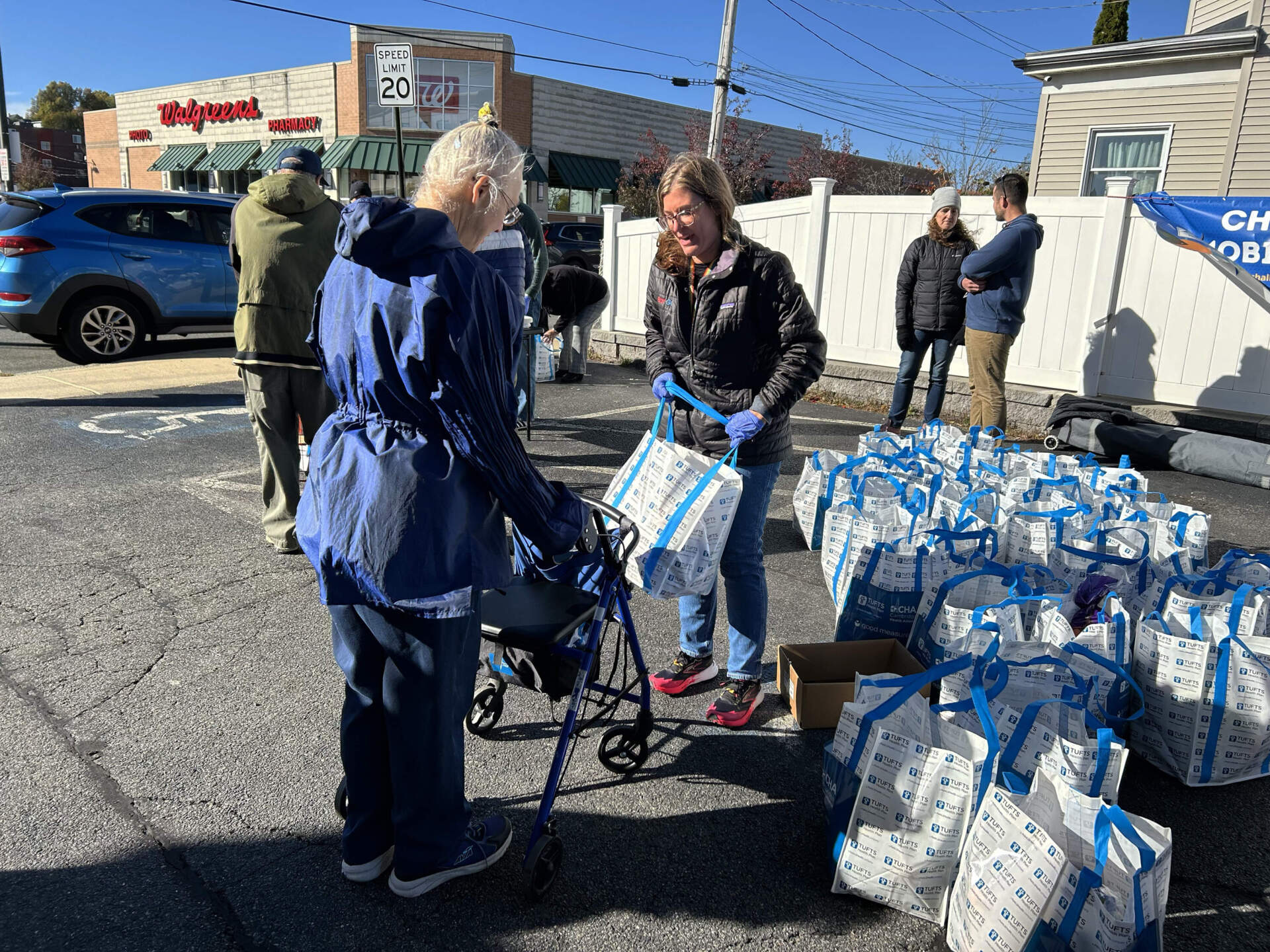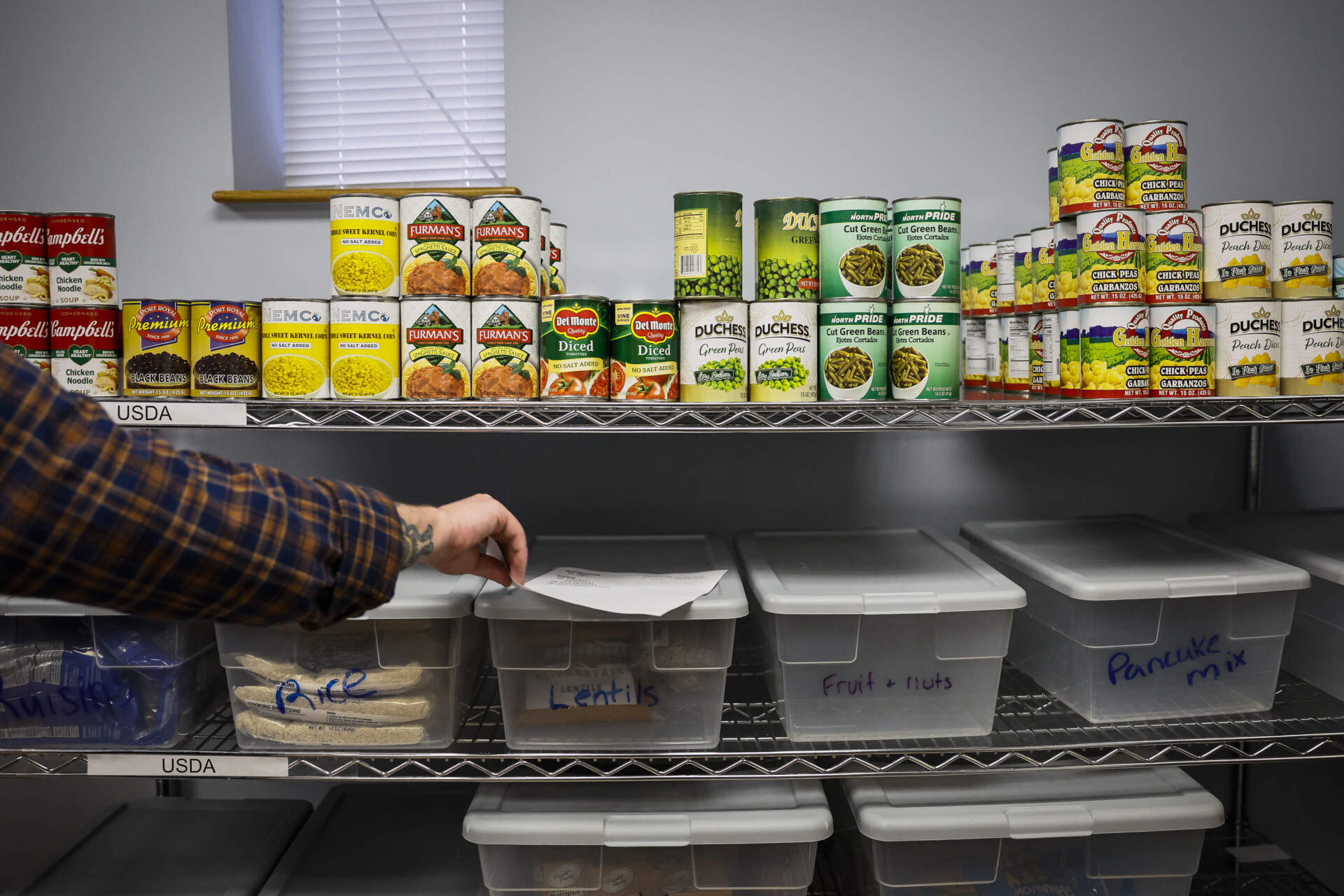About one in six Massachusetts residents are waiting to hear when they will receive money through SNAP, the Supplemental Nutrition Assistance Program, this month and how much. The national aid program ran out of money over the weekend amid the government shutdown.
This morning, in response to a court order, the Trump administration said it is sending states $4.65 billion from an emergency fund — enough to cover roughly 50% of benefits this month. Gov. Maura Healey said she still doesn’t know the amount of money Massachusetts will get, when, or how quickly it can be transferred to SNAP recipients’ accounts.
“We are awaiting clarity,” said Healey in a statement. “But the President should not stop there. President Trump should commit to fully funding SNAP benefits and make these full benefits available as soon as possible.”
SNAP funds roll out over the first two weeks of each month, so many households are reaching the end of last month’s benefit. About 20% of Massachusetts recipients would have received their monthly total, $324 on average, this past weekend.

On Saturday, the first day of the freeze, nearly 600 people waited in line outside a health center in Revere for just one bag of groceries. Lori Tivay clutched a pink laminated card that secured her spot — number 150.
“I’m thankful,” Tivay said, despite the hours-long wait. “I mean, otherwise I wouldn’t survive. I’ve got a lot going on.”
Tivay is a cancer survivor and has a heart condition. Health insurance does not cover all of her medicines and supplies, so she’s constantly juggling bills. This month, she’ll have to choose between rent, medicine and food.
“It’s affecting me and a lot of people, and it’s pretty bad,” she said.
Tivay is among the 265,000 Massachusetts residents on SNAP who are 60 or older. Another 311,000 adults qualify because they have a disability. Claudia Martinez’s husband can’t work because he is disabled and gets SNAP benefits.
“So now it’s like oh my God,” Martinez said, unable to explain what the couple would do without the monthly boost to their grocery budget. It provides about $200, she added, “but it’s enough for us.”
Massachusetts will have to recalculate the amount it provides for Martinez’s husband and all 650,000 households in the program. Not receiving the full $200 would be especially hard right now for Martinez because she is out of work. She’s a courier, but she had a car accident and is struggling to pay for repairs. She plans to use every bit of the food coming to her.
“For two weeks, we can be good with the bag, the vegetables,” she said, “it can be enough.”
The bag Martinez will stretch as far as she can contains a can of kidney beans, a jar of peanut butter and one bag of oats as well as onions, carrots, apples, cucumbers, pears and limes. Most bags also get a large head of Napa cabbage. A Greater Boston Food Bank truck dropped off the items on pallets early Saturday in the parking lot behind the Revere Care Center, run by Cambridge Health Alliance.
Forty volunteers affiliated with the health center moved down an assembly line, filling one bag after another. Among them was 14-year-old Stella Borghesi-Lyon, who came with her grandfather, a psychiatrist affiliated with the health center. Borghesi-Lyon was visiting from London, during a school vacation.
“It’s really amazing that this is happening,” she said watching the race to prepare bags for the long line of clients, “and that people want to put the effort into supporting people.”
“Food is such a basic right. People should have food. They shouldn’t have to stand in line.”Jean Granick with Cambridge Health Alliance
At one edge of the parking lot, three Harvard students prepared a salad, offered samples and added the recipe to each bag.
Residents all over Massachusetts are holding food drives, fundraisers and volunteering to help friends, neighbors and strangers who are losing SNAP benefits. Long standing projects like this once-a-month food market are boosting their capacity.
“Food is such a basic right,” said Jean Granick, who manages this project through the Department of Community Health at Cambridge Health Alliance. “People should have food. They shouldn’t have to stand in line.”
Cambridge Health Alliance started handing out groceries eight years ago after patients highlighted fears about not having enough to eat on screening forms. On this day, 571 parents or single clients will pick up food to be shared with more than 2,000 household members.
Madelyn Pineda Alvarez, a community liaison worker in Revere, said many more residents would be here, but they fear the line creates a target for federal immigration officers. She fielded a few calls from people asking if it was safe to come.
“In that situation I try to give them a little bit of confidence,“ Alvarez said, but she acknowledged that isn’t always possible. “I mean the fears, you cannot take that from their mind.”
For people afraid to stand in line, Alvarez offered to meet inside the clinic. The staff also gave a bag of food to anyone who stopped by on Saturday for a free blood pressure screening, flu or COVID vaccine.
Alvarez said she understands the pressures her fellow Revere residents face and the tough choices they’re making. She receives SNAP to help feed her four kids. In Massachusetts, 335,000 children – about a third of recipients – rely on SNAP to eat.
Alvarez said she’s grateful her children receive free breakfast and lunch at school. She’s told them not to worry about anything else, that’s her job. But right now, Alvarez can’t figure out what’s happening with SNAP and is overwhelmed.
“I hear different stories, so much information out there,” Alvarez said. “Oh my God, too much.”

Not everyone waiting in line was on SNAP. Most people who qualify, 67%, live on less than 100% of the federal poverty level, which means they survive on an annual income of less than $21,150 for a household of two. But many other residents are also struggling to get by. Wilfer Sanchez works full-time as a janitor and owns his home.
“People think I’m rich and don’t need help because I own a house,” he said. “But everything is so expensive right now.”
This food pantry, like most, doesn’t ask about income. Organizers aim for a welcoming atmosphere to relieve the shame or embarrassment that keeps some people at home.
Food banks that supply programs like this one warned they can’t make up for the 56 million meals SNAP benefits would typically cover in Massachusetts this month. The Healey administration doubled state funding for food banks — from $4 to $8 million for November. Some advocates are urging state lawmakers to go further and close as much of the federal funding gap as possible.
“We can make a different choice in Massachusetts about how we make sure our residents can put food on the table and how we wrap around the federal government’s failures to improve the day-to-day lives of our neighbors for the month of November,” said Vicky Negus, senior policy advocate at the Massachusetts Law Reform Institute.